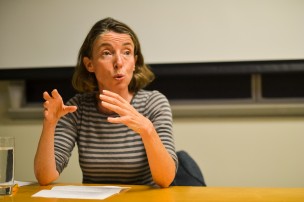
Emma Sky, director of Yale World Fellows and Senior Fellow at the Jackson Institute, shared her personal experiences working with the United States Military in Iraq during the war. In a discussion on Wednesday, Sept. 30 titled “Unraveling Iraq,” Sky spoke before opening up to a question-and-answer section and then a signing for her new memoir detailing this period.
Sky is the author of “The Unraveling: High Hopes and Missed Opportunities in Iraq,” based on her experiences as an advisor to the US Commanding General in Iraq. It has gained a lot of attention in both the U.S. and the UK, receiving rave reviews.
“[I] felt I had a duty to record my experiences,” Sky said.
Her journey began in 2003 when she volunteered to work for the Coalition Provisional Authority, first serving as the Governorate Coordinator for the city of Kirkuk, and then becoming a top advisor for the U.S. forces in Iraq. She spoke of her initial experiences, going out and meeting people, hearing all the different languages, and discovering the beauty of Iraqi culture.
She also shared the story of her near-assassination in her first week.
“I [was] a symbol of an illegal occupation,” she said.
She continued by describing her observation of U.S. troops and their mindsets. There existed the idea that there were only “good guys” and “bad guys,” with nothing in between. She took it upon herself to educate those with whom she worked closely, explaining that anyone can be a friend or enemy, depending on how they are treated.
Her journey working as an advisor lasted until 2010, when she finally left Iraq during a tumultuous transition of power to a new government.
Assistant Professor of Government Ioana Emy Matesan acknowledged Sky’s expertise in Middle Eastern studies.
“She has intimate knowledge of the chaos and challenges of the US invasion, the horrors of violence, and the frustrations of missed opportunities and unintended consequences,” wrote Matesan in an email to The Argus.
Matesan continued by further explaining Sky’s story and accomplishments.
“Sky’s is a story about the unraveling of Iraq, a story about Middle East politics, a story about American foreign policy, a story about occupation, and a story of a female peace activist working with generals and living among American troops in Iraq,” she wrote. “Her insights defy the all too often partisan lines on the war in Iraq, and are relevant to the contemporary challenges in the Middle East, as well as to broader discussions and theories of state-building, democratization and civil-military relations.”
The question-and-answer portion of the talk spurred a dynamic discussion of both Sky’s personal experience and related topics in international politics.
Kinsey Yost ’19 inquired about the realities of the war in Iraq, as opposed to what was shown in the media.
“Were there instances that your experience was different than media portrayal?” she asked of Sky. “Did you find that it was altered?”
This question began a discussion of the way U.S. media covers foreign affairs. Sky explained that the media portrayal is about Americans, and as such, only a one-sided view of foreign countries is given. She argues that it tends to erase other countries of their culture and history, and instead portray them as an ahistorical entity failing to acknowledge the complexity of every situation.
“[Iraq] is the place where civilization began and media portrays Iraq as if it hadn’t started until 2003,” Sky said.
Sky, having been opposed to the war, decided to volunteer to make Iraq a better place and also because she felt a personal need to apologize. Amad Amedy ’19 inquired about this.
“Do you still feel the need to apologize?” Amedy asked .
Sky responded with her views again on U.S. media and the way seemingly nobody has been held accountable for certain effects the war has had in Iraq.
“[This was] a war that destroyed a country, there’s enough blame to go around,” Sky said.
Sky ended the event on a lighter note with a story about a close friend she met in Iraq through the war; this story was intended to highlight her close relationship with the country and its people. After her experiences working in Iraq, she continues to regularly visit the friends she made there.
She recalled one friend from Iraq in particular. He told her, “Even though they destroyed our country, we still take them out for lunch.”


Leave a Reply